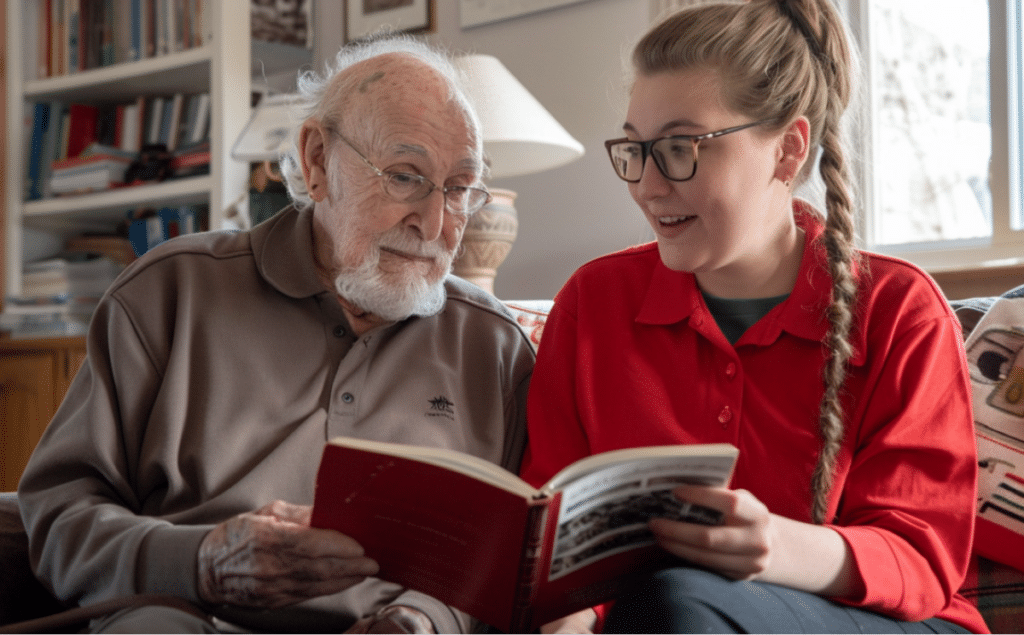Dementia Home Care
Nebraska Care Registry connects families and individuals with independent caregivers in their local communities. The registry allows Nebraskans who need assistance with daily activities due to age, disability, or other circumstances to hire pre-screened caregivers.
Caregivers have undergone background checks and screening. Services they provide range from personal care such as bathing and dressing to household chores, meal preparation, and companionship. Some caregivers also have specialized training to assist with medications, injuries, and illnesses.
Nebraska Care Registry helps connect those needing care with compassionate caregivers, senior companions, and respite care providers. We provide resources to support independent living for the elderly and disabled by promoting the health and well-being of both caregivers and care recipients.
Caring for a loved one with Alzheimer’s disease or other forms of dementia presents unique challenges for families. As cognition and abilities decline, extra assistance ensuring safety and quality of life is often needed.
Nebraska Care Registry provides independent caregivers to meet the changing needs of those with memory loss while also supporting the primary family caregivers.
Dementia Home Care Services Include:
- Companion Care
- Homemaker Services
- Personal Care Services
- Respite Care for Family Caregivers
- Full-Time Home Care
- Part-Time Home Care
We provide resources to support independent living for the elderly and disabled by promoting the health and well-being of both caregivers and care recipients.
Benefits of In-Home Dementia Care
Being a family caregiver often leads to emotional and physical fatigue. Having supplemental support from Nebraska Care Registry can help in the following ways:
- Independent Caregivers provide oversight when family members need a short-term respite break.
- Independent Caregivers promote engagement through activity and conversation.
- Independent Caregivers support mealtime, bathing/dressing, and medication routines.
- Independent Caregivers provide safety for clients who wander, to redirect to safe areas.
- Independent Caregivers communicate when new symptoms or behaviors are observed.
We ensure our caregivers are highly skilled and compassionate while giving attention to our clients. With them, you can be sure your loved ones are always safe and have the highest level of care.
Independent Caregivers Providing Dementia Home Care in Lincoln, Kearney, Grand Island, North Platte, Hastings, Omaha, Columbus, Broken Bow, Scottsbluff, Norfolk, and surrounding areas.

Understanding Dementia Symptoms and Progression
Dementia refers to severe memory loss and loss of cognitive ability that disrupt daily functions.
While Alzheimer’s disease accounts for 60-80% of cases, other types include vascular, Lewy body, and frontotemporal dementia.
Regardless of the cause, common symptoms involving complex changes in memory, verbal skills, perception, mood, and physical health emerge over time.
Unique behaviors also arise like wandering or sundowning aggression later in the day. As the disease progresses, care needs increase gradually or in sudden shifts following events like infections or new medications.
Dementia Progression and Adjusting Care
Independent Caregivers pay close attention to physical and cognitive changes that show a need for different care approaches. Triggers include:
- Increase in memory loss affecting self-care skills, safety awareness, or behavior and mood
- Loss of motivation impacting bathing, eating, and medication compliance
- Emerging unsafe wandering tendencies and sundowning behaviors
- Decline in verbal communication and reasoning abilities
- New difficulty walking, frequent falling, or reduced mobility
Regular communication allows for proactive care. Caregivers also provide guidance on home safety modifications, nutrition options, and more.

We start a client relationship by providing a free consultation where together we can explore your individual needs and offer the most helpful and appropriate care plan.
Nebraska Care Registry Services for Dementia and Alzheimer’s
Home companion and personal care services focus specifically on the needs of individuals with Alzheimer’s disease and related dementias.
Dementia Care Services Include:
- Safety and Companionship: Independent Caregivers provide reassuring company through conversation, music, puzzles, games, and reminiscence. For those who tend to wander unsafely, we redirect them to more suitable areas.
- Personal Care: Assistance with bathing, hygiene, medication reminders and mobility/transfers boosts independence.
- Meals and Nutrition: We can prepare healthy, balanced meals or provide stand-by assistance when safety is a concern.
- Respite for Family Caregivers: Regular visits give family members a much-needed break for self-care.
- Light Housework: Laundry, changing bed linens, and tidying up the living environment are included.
- Safety Solutions: From home modifications to medical alert installation, we have resources to boost safety.
We know each phase of dementia brings new difficulties, so care adjusts seamlessly through reliable communication and documentation. Support groups and community connections give family members and clients needed resources too.

